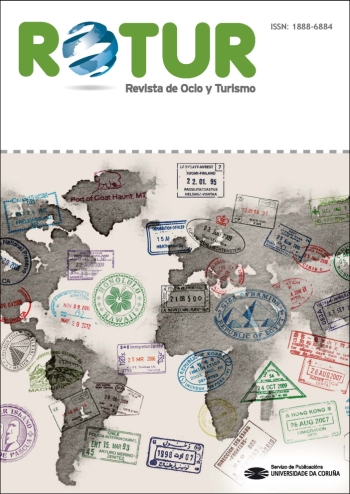Sustainable tourism: inland tourism in Ourense
Main Article Content
Abstract
Tourism development in recent years has been characterised by the diversification and expansion of the sector in all aspects of its activity. The aim of this study is to examine the inland tourism phenomenon as an endogenously sustainable alternative, in which culture, gastronomy, environment, nature and ethnography represent key components of the tourist experience. The study focuses on the case of Ourense, the only Galician province without a coastline. The analysis begins by detailing the main features of inland tourism in Ourense: spatial diversity, reduced seasonality, flexibility in terms of age, family structure and price. Tourism demand is assessed in terms of the number of visitors, number of overnight stays and average length of stay, with comparative analysis of growth, correlation and temporal regression between Ourense and Galicia as a whole, and additional analysis of seasonality in relation to foreign tourism. The quantitative comparison of tourism variables reveals a direct, positive correlation between tourism demand and the explicit message and example of sustainability offered by the ethnographic, natural and social environment of Ourense.
Keywords:
Downloads
Metrics
Article Details
References
Aranda, Yesid y Combariza, Juliana (2007). Las marcas territoriales como alternativa para la diferenciación de productos rurales. Agronomía Colombiana, 25(2), 367-376. https://www.redalyc.org/pdf/1803/180320296021.pdf
Cámara Oficial de Comercio de Ourense (2008-2019). Estudio socioeconómico anual de la Provincia de Ourense 2008 y siguientes. Ourense, España: Cámara Ourense. https://docplayer.es/91152152-Estudio-socioeconomico-provincia-de-ourense-2008.html
Crecente Asociados (2014). Plan Estratégico Ourense Provincia Termal. Ourense, España: Diputación Provincial de Ourense - Agencia Turismo de Galicia. https://www.crecenteasociados.com/plan-estratexico-ourense-provincia-termal
Cors Iglesias, Martí (2020). Una aproximación geográfico-jurídica al agroturismo en España desde el punto de vista de la oferta. Cuadernos de Turismo, (46), 25-46. https://doi.org/10.6018/turismo.451481
Deputación Ourense (2020). La Diputación de Ourense reabre el primer programa social en España. Deputación Ourense. https://www.depourense.es/index.php/actualidade/5067-la-diputacion-de-ourense-reabre-el-primer-programa-social-en-espana
Di Clemente, Elide, Mogollón, José Manuel, & López-Guzmán, Tomás (2014). La gastronomía como patrimonio cultural y motor del desarrollo turístico. Un análisis DAFO para Extremadura. Tejuelo: Didáctica de la Lengua y la Literatura, Educación, (9), 817-833. https://dialnet.unirioja.es/descarga/articulo/5385975.pdf
EHTTA (2019). Destinos Termales. Ehtta.eu - European Historic Thermal Towns Association. https://ehtta.eu/portal/es/home-3/
H2O Magazine (2019). Turismo termal: oportunidades. H2O Magazine. https://www.caldaria.es/turismo-termal/
Flores Hernández, Fernando, Consuegra Gómez, Sergio y García Pérez, Jacobo (2010). La Alberca de Trujillo. Madrid, España: Museo del Juego.
Hosany, Sameer, Ekinci, Yuksel y Uysal, Muzzaffer (2006). Destination image and destination personality. An application of branding theories to tourism places. Journal of business research, 59(5), 638-642. https://doi.org/10.1016/j.jbusres.2006.01.001
IGE, Instituto Galego de Estatística (2019). Estadísticas de ocupación en establecimientos turísticos e infraestructura turística. IGE. http://www.ige.eu/web/mostrar_actividade_estatistica.jsp?codigo=0305002&idioma=es
INE, Instituto Nacional de Estadística (2020a). Encuesta de ocupación hotelera. INE. https://www.ine.es/dyngs/INEbase/es/operacion.htm?c=Estadistica_C&cid=1254736177015&menu=resultados&idp=1254735576863#!tabs-1254736195431
INE, Instituto Nacional de Estadística (2020b). Movimientos turísticos en fronteras, FRONTUR. INE. https://www.ine.es/dyngs/INEbase/es/operacion.htm?c=Estadistica_C&cid=1254736176996&menu=ultiDatos&idp=1254735576863#:~:text=%C3%9Altima%20Nota%20de%20prensa&text=En%20los%20primeros%2011%20meses,79%2C2%20millones%20de%202019.
IET, Instituto de Estudios Turísticos (2014-2019). Encuesta de Gasto Turístico (Egatur). IET. http://estadisticas.tourspain.es/es-es/estadisticas/egatur/paginas/default.aspx
Jardón Ferreiro, Eladio (2020). El posicionamiento estratégico: una identidad competitiva Glocal. La Ourensanía (Tesis doctoral)., Universidad de Valencia, España. https://roderic.uv.es/handle/10550/75927
Jiménez Morales, Mònika y San Eugenio Vela, Jordi de (2009). Identidad territorial y promoción turística: la organización de eventos como estrategia de creación, consolidación y difusión de la imagen de marca del territorio. ZER: Revista de estudios de comunicación, 14(26), 277-297.
Kotler, Phill, Bowen, John y Makens, James (2004). Marketing turístico. Madrid, España: Pearson Educación.
Ley 7/2011, de 27 de octubre, del Turismo de Galicia. BOE, Núm. 291, de 3 de diciembre de 2011, pp. 1-49. https://www.boe.es/buscar/pdf/2011/BOE-A-2011-19058-consolidado.pdf
Ley 5/2016, de 4 de mayo, del patrimonio cultural de Galicia. DOG, Núm. 92, 16 de mayo de 2016, p. 18576. https://www.xunta.gal/dog/Publicados/2016/20160516/AnuncioC3B0-110516-0001_es.html
Moral Moral, María, Fernández Alles, María Teresa y Sánchez Franco, Manuel Jesús (2019). Análisis del turismo rural y la sostenibilidad de los alojamientos rurales. Revista Espacios, 40(1), 3-18. http://www.revistaespacios.com/a19v40n01/a19v40n01p03.pdf
Pérez Alberti, Augusto (1986). A Xeografía. Vigo, España: Editorial Galaxia.
Pérez, Samuel (2010). El valor estratégico del turismo rural como alternativa sostenible de desarrollo territorial rural. Revista Agronomía Colombiana, 28(3), 507-513. https://www.scielo.org.co/pdf/agc/v28n3/v28n3a18.pdf
Siente Galicia (2019). Burgas de Ourense, termalismo e historia de Galicia. Siente Galicia. https://www.sientegalicia.com/blog/burgas-ourense-termalismo-galicia/
Tello Rozas, Sonia (2014). Turismo sostenible a través de innovaciones de economía social. Turismo y Patrimonio (8), 93-100. https://doi.org/10.24265/turpatrim.2014.n8.07
Xunta de Galicia (2020). Centros de interpretación en Galicia. Turismo.gal. https://www.turismo.gal/localizador-de-recursos/-/sit/patrimonio-cultural/centros-de-interpretacion/galicia?langId=es_ES







